|
|
|
Sort Order |
|
|
|
Items / Page
|
|
|
|
|
|
|
| Srl | Item |
| 1 |
ID:
109127
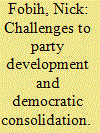

|
|
|
|
|
| Publication |
2011.
|
| Summary/Abstract |
The second half of the twentieth century witnessed the emergence of the party system and democracy in African countries, for example Ghana, in the period preceding the postcolonial era. This article looks at some of the challenges facing Ghana's democratic consolidation and party development, and some of the institutional benchmarks required to help to promote effectively an accountable, participatory and democratic party system in the country in order to consolidate further its democracy. The study concludes with the view that regardless of their apparent weaknesses, political parties in Ghana are generally important institutions that grease the wheels of the country's democratic governance in the post-transition era.
|
|
|
|
|
|
|
|
|
|
|
|
|
|
|
|
| 2 |
ID:
120213
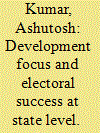

|
|
|
|
|
| Publication |
2013.
|
| Summary/Abstract |
Emergence of regional states in contemporary India as an effective arena for political and economic development has given state-level leaders a growing power. In the present coalition era, which reflects such regionalisation, this brings increasing prominence to effective state-based parties and their leaders. Focusing on recent politics of Bihar, this article shows in what ways Nitish Kumar, Chief Minister of Bihar, since 2005, unlike his predecessor Lalu Yadav, comes across as 'unusual'. Setting aside neo-patrimonial political tendencies, much in vogue among the new crop of state leaders, Nitish Kumar has instead focused on channelling both private and public resources to provide quality governance in an erstwhile 'failed state'. This, more than rootedness in a traditional community or vote bank, may largely explain continued electoral success, though a leader also depends on those around him, with all the risks for effective implementation that this entails.
|
|
|
|
|
|
|
|
|
|
|
|
|
|
|
|
| 3 |
ID:
098859
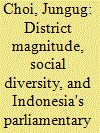

|
|
|
|
|
| Publication |
2010.
|
| Summary/Abstract |
This study analyzes the party system in Indonesia's parliamentary elections since 1999. It argues that neither district magnitude nor social diversity accounts for the dramatically increased number of parties in votes at the district level over time; the increase may stem from the introduction of popular presidential elections and the rise of new issues.
|
|
|
|
|
|
|
|
|
|
|
|
|
|
|
|
| 4 |
ID:
105587
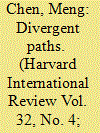

|
|
|
| 5 |
ID:
190170
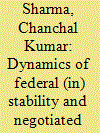

|
|
|
|
|
| Summary/Abstract |
Many studies have demonstrated a trend towards greater centralization of the federal system in India since 2014. However, the causal mechanisms that underpin this centralization remain underexplored. This article systematically explores the processes involved in tipping the delicate federal balance in favour of greater central control, and in doing so pays particular attention to the role of the party system therein. Our analytical narrative is structured around the assertion that ‘negotiated cooperation’ is contingent upon: (a) the interaction between constitutional structure and federal politics; (b) the capacity and willingness of subnational incumbents to safeguard their policy space and (c) the nature of party organization and the ideological disposition of the polity-wide parties towards territorial power-sharing. Drawing from India’s experience since 1952, we demonstrate that a dominant party system does not necessarily entail encroachment on subnational authority. At the most, it is a necessary but insufficient condition for federal imbalance. However, the problem of federal encroachment arises only when the dominant party is internally centralized and personalized, advocates unitarism and operates in a context of weak constitutional, political, procedural and judicial safeguards for self-and shared-rule. India under the leadership of Indira Gandhi, but more recently of Narendra Modi, comes close to meeting these conditions.
|
|
|
|
|
|
|
|
|
|
|
|
|
|
|
|
| 6 |
ID:
174452
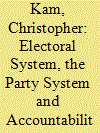

|
|
|
|
|
| Summary/Abstract |
Electoral accountability requires that voters have the ability to constrain the incumbent government’s policy-making power. We express the necessary conditions for this claim as an accountability identity in which the electoral system and the party system interact to shape the accountability of parliamentary governments. Data from 400 parliamentary elections between 1948 and 2012 show that electoral accountability is contingent on the party system’s bipolarity, for example, with parties arrayed in two distinct blocs. Proportional electoral systems achieve accountability as well as majoritarian ones when bipolarity is strong but not when it is weak. This is because bipolarity decreases the number of connected coalitions that incumbent parties can join to preserve their policy-making power. Our results underscore the limitations that party systems place on electoral reform and the benefits that bipolarity offers for clarifying voters’ choices and intensifying electoral competition.
|
|
|
|
|
|
|
|
|
|
|
|
|
|
|
|
| 7 |
ID:
084560


|
|
|
| 8 |
ID:
062543
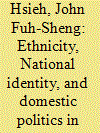

|
|
|
|
|
| Publication |
Feb-Apr 2005.
|
|
|
|
|
|
|
|
|
|
|
|
|
|
|
|
| 9 |
ID:
062548
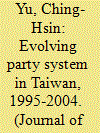

|
|
|
|
|
| Publication |
Feb-Apr 2005.
|
|
|
|
|
|
|
|
|
|
|
|
|
|
|
|
| 10 |
ID:
131388
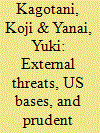

|
|
|
|
|
| Publication |
2014.
|
| Summary/Abstract |
A number of US overseas bases were deployed around the world to protect allies and maintain regional peace. Some bases have been stationed in the partner countries for the long term, whereas others were withdrawn from their partners' territories in the face of strong local opposition. Understanding local support for US overseas bases is indispensable for managing alliance politics and pursuing US grand strategy. This article addresses the 1972-2006 Okinawa gubernatorial elections where the US base issue had been chronically politicized and locals supported pro-base candidates six out of ten times contrary to their anti-base preferences. This article addresses external threats as a determinant of vote choice. We analyze the gubernatorial elections as the opportunities for Okinawans to convey their support for or opposition to the current national security policy since US bases in Okinawa are critical to Japan's security. We find that external threats do encourage Okinawans to support pro-base candidates, but the effect of perceived security-related risks is moderate. Moreover, physical and psychological costs such as airplane crashes, environmental and noise pollution, and rape incidents have larger influence on the election outcomes rather than material benefits such as the fiscal transfers and base-related subsidies, which is contrary to the conventional view.
|
|
|
|
|
|
|
|
|
|
|
|
|
|
|
|
| 11 |
ID:
105386
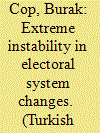

|
|
|
|
|
| Publication |
2011.
|
| Summary/Abstract |
This article examines the extremely volatile character of electoral system changes that took place in Turkey from the end of the Second World War up until the end of the 1990s. Motives that drove these changes were either related to intentions to prevent the undesirable repetition of the past circumstances, or to political actors' short-term goals. Some of these changes seem to have reached their objectives while some others have not. The volatility in electoral institutions' design was also strongly associated with the fluctuations Turkey experienced in terms of democratic consolidation. In this respect, the Turkish case may offer a variety of useful empirical material for the prospective designers of new institutions in a number of former communist countries that are likely to experience further stages of democratic transition/consolidation in the years ahead.
|
|
|
|
|
|
|
|
|
|
|
|
|
|
|
|
| 12 |
ID:
131063
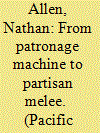

|
|
|
|
|
| Publication |
2014.
|
| Summary/Abstract |
The party system in Indonesia has expanded in the post-Suharto era. With each successive election, voters have spread their support across a wider array of parties. This has occurred despite deliberate institutional tweaks designed to consolidate the system by privileging large parties. Why has the party system expanded despite increasing institutional incentives to consolidate? This article places party system change in a broader context of decentralization and corruption. The decentralization and deconcentration of political power has opened multiple avenues for voters and elites to access state resources. Whereas major parties were expected to dominate resources in the immediate aftermath of the transition, changes to the formal and informal institutions eroded their control over the state. This has caused previously consolidated subnational party systems to fracture. The argument is demonstrated using narrative and newly constructed cross-district datasets. The paper develops the concept of rent opportunities, defined as the ability to access and abuse state resources. Party system expansion has been greatest in areas with high rent opportunities, where both voters and elites are Social Media Presidential Election Indonesia 2014 Indonesiaparticularly motivated by the competition for state resources. In these areas, characterized by large state sectors, the formerly authoritarian party (Golkar) initially won large electoral victories due, in part, to its control over patronage. As Golkar lost its ability to monopolize resources, the party system fractured. Voting for small parties surged and the party machine was replaced by a partisan melee. My argument exposes the limits of institutional engineering and underlines the formative role corruption has had on the evolution of Indonesia's party system.
|
|
|
|
|
|
|
|
|
|
|
|
|
|
|
|
| 13 |
ID:
122083
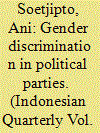

|
|
|
| 14 |
ID:
156776
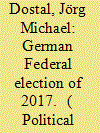

|
|
|
|
|
| Summary/Abstract |
The 2017 German federal election delivered dramatic electoral decline of the two traditional main parties, the Christian Democrats (CDU/CSU) and the Social Democratic Party (SPD), who had governed Germany in a ‘grand coalition’ government since 2013. The main reason for this outcome was the decision by Chancellor Angela Merkel to open Germany's borders for refugees and migrants, an unprecedented policy that abandoned border controls and remained in place between September 2015 and March 2016. This article focuses on how the refugee and migration problem subsequently turned into a wedge issue, splitting most German political parties and handing a major election victory to the main critics of Merkel's decision, namely the rightist Alternative for Germany (AfD) and the right-wing liberals of the Free Democratic Party (FDP). Rather than explaining these developments in isolation, the article highlights how past welfare state retrenchment and fear over future economic prosperity make significant groups of the electorate, including former supporters of left-of-centre parties, lose confidence in the ability of the political system to deliver stability and social integration.
|
|
|
|
|
|
|
|
|
|
|
|
|
|
|
|
| 15 |
ID:
102710


|
|
|
|
|
| Publication |
2011.
|
| Summary/Abstract |
his article explores the origins of peak employers' associations to understand why countries produce highly centralized macrocorporatist groups, weaker national associations but stronger industry-level groups, or highly fragmented pluralist associations. The authors suggest that the structure of partisan competition played a vital causal role in the development and evolution of these peak associations. The leadership for peak employers' association development came from business-oriented party activists and bureaucrats, who sought both to advance industrial development policy and to solve specific problems of political control. Business-oriented party leaders and bureaucrats in both predemocratic and democratic regimes feared the rising tide of democracy and labor activism and viewed employer organization as a useful tool for political control, to secure parliamentary advantage, and to serve as a societal counterweight to workingclass activism. Because leadership for association building came from the state, the political rules of the game were crucial to outcomes. The structure of party competition and state centralization shaped incentives for strategic coordination for both political actors and employers. Dedicated business parties were more likely to develop in countries with multiparty systems and limited federal power sharing than in countries with two-party systems and federalism: in a multiparty context where no single party was likely to gain power, each party had an incentive to cooperate with other social groups. Moreover, business-oriented party leaders and bureaucrats in multiparty systems were motivated to delegate policy-making authority to coordinated societal channels for industrial relations, because they anticipated that employers would win more in these channels than in parliamentary settings where the center and left could form a coalition against the right. Again, centralized party systems were more likely than federal ones to develop a dedicated national business party that transcended regional cleavages and to retain a strong role for the state in the governance of industrial relations.
|
|
|
|
|
|
|
|
|
|
|
|
|
|
|
|
| 16 |
ID:
169775


|
|
|
|
|
| Summary/Abstract |
The African National Congress has long been the brightest star in the firmament of the party system in South Africa, but its eminence is fading in the face of a rising Democratic Alliance. The success of the Democratic Alliance is instructive. The party barely survived the passage to majority-rule, but nonetheless escaped the gravitational pull of its historically narrow support base to challenge effectively for power across South Africa. The question is how has it come to present a credible challenge to the ANC, and whether there are broader lessons to draw from this example of a successful opposition in an African democracy. This article presents a theory explaining how the leadership of the Democratic Alliance made an expensive, unorthodox and risky investment in the party’s organization that centralized power in order to manufacture a new identity, which transformed the party’s capacity to appeal to new voters in South Africa’s political system. The rise of the Democratic Alliance demonstrates how, and under what conditions, the leadership of an opposition party can turn the debate at election time away from identity and on to issues and, in the process, disrupt the stability of a dominant party system.
|
|
|
|
|
|
|
|
|
|
|
|
|
|
|
|
| 17 |
ID:
085840
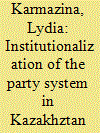

|
|
|
|
|
| Publication |
2008.
|
| Summary/Abstract |
The democratic changes underway in the Republic of Kazakhstan and the Russian Federation are focused on the development of parties and the party system, which explains the immense interest in the process demonstrated by their own and foreign communities of political scientists. They concentrate on the emergence and stages of the parties' development, their legal institutionalization, the "party of power" phenomenon, conduct of parties in election campaigns, the way a definite type of party system took shape, etc.
|
|
|
|
|
|
|
|
|
|
|
|
|
|
|
|
| 18 |
ID:
078592
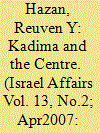

|
|
|
| 19 |
ID:
184760


|
|
|
|
|
| Summary/Abstract |
In this article, I offer a theory of lawmaking in multiparty presidential systems with different legislative institutions. I present a model that combines Krehbiel's pivotal politics theory with Tsebelis's veto players theory. This model simplifies various institutional veto players into the de facto veto players. I analyze the model to explain how the government type (unified versus divided governments), the legislative rules (majoritarian versus supermajoritarian rules), and the party system (two-party versus multiparty systems) affect legislative productivity. I apply the theoretical results obtained to solve the puzzle about the nondifferential legislative performance between unified and divided governments in the National Assembly. I test a hypothesis stating that the distance between the ideological positions of the agenda-setter and the de facto veto players has a negative effect on the proportion of controversial bills enacted between the 16th and the early 21st National Assemblies.
|
|
|
|
|
|
|
|
|
|
|
|
|
|
|
|
| 20 |
ID:
089883
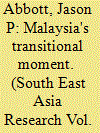

|
|
|
|
|
| Publication |
2009.
|
| Summary/Abstract |
Many theorists of democratization transition have, either explicitly or implicitly, a teleological concept of political progress, liberalization and reform. For such theorists, countries such as Malaysia are therefore in transition towards substantive 'full' liberal democracy. Taken in this light, the significant advances by opposition political parties in the 2008 federal and state elections in Malaysia represent a major advance towards this end goal. While many have highlighted that Malaysia may in fact be an exception to this rule, this paper contends instead that the Malaysian case study challenges the central tenets of democratic transition more profoundly. Indeed, since independence the Malaysian regime has proved remarkably resilient and resistant to pressures for political liberalization.
|
|
|
|
|
|
|
|
|
|
|
|
|
|
|
|
|
|
|
|
|